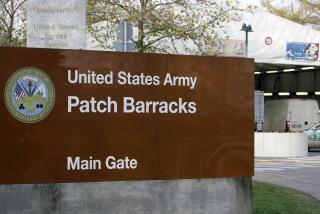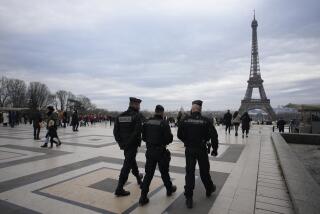Bombings Increasing in Hungary
- Share via
Europe
Hungary: A car bomb exploded just off Budapest’s main tourist shopping street, killing four people and injuring at least 20. The July 2 bomb, believed to be part of a turf battle between criminal gangs, blew out the windows of a nearby McDonald’s restaurant and left five foreigners--a German, a Finn, a Czech and two Syrians--among the injured.
More than 100 bombings have struck Hungary in the last two years as Russian, Ukrainian, Romanian, Turkish and Arab gangs have fought to control territory and businesses. The State Department’s latest information sheet on Hungary warns visitors about street crime, burglary and car theft but makes no mention of gang warfare.
Worldwide
The Lee Group, a security consulting firm for international businesses, offers these suggestions on countering street crime while abroad:
* Leave your passport in your hotel safe and carry a photocopy.
* Walk in the middle of the sidewalk to deter would-be thieves.
* Stand back from the curb while waiting to cross. Motorcyclists sometimes grab valuables from pedestrians at curbside.
* Leave expensive-looking jewelry at home.
* Carry small-denomination bills in one place, larger bills in another, so that criminals will not know how much money you have.
Africa
The State Department has issued travel warnings for two African nations:
Eritrea: This Horn of Africa country is fighting with neighboring Ethiopia over a border dispute. The main airport has been bombed, and the U.S. Embassy has evacuated diplomatic dependents and warned all nongovernmental Americans to leave. In Ethiopia itself, Americans are warned to stay away from the border area.
Guinea-Bissau: With the outbreak of civil war in this West African country, all Americans have been warned to leave. Diplomatic personnel have been evacuated, and the embassy has temporarily shut down.
Briefly . . .
Belize: A Maryland science teacher was shot to death at an inn on the coast about 80 miles south of Belize City while trying to protect his wife and son from robbers who entered their room. According to the State Department, crimes against tourists in Belize resorts are rare. . . . Mexico: Just outside Acapulco, armed bandits blocked the road to Zihuatanejo, stopped a luxury tourist bus and robbed the passengers of more than $2,200, the Associated Press said. One passenger was wounded by a gunshot. The tourists’ nationalities were not reported. . . . Ukraine: American visitors, especially those of African or Asian heritage, may be subject to racially motivated attacks and harassment by skinheads, the State Department warns. Stops and searches by local law enforcement in Kiev may also lead to harassment and physical abuse. A similar warning was issued for Moscow in April. . . . Jamaica: Rioters set fires, looted shops and blocked roads in the west coast resort town of Negril after police shot a man who allegedly assaulted a young girl, the Reuters news service reported. Tourists along the hotel strip were not affected, since the rioting was largely confined to downtown. . . . Indonesia: With the lessening of violence, the State Department is no longer warning Americans against travel to Indonesia but cautions that the political and economic situation remains unsettled. Visitors should avoid crowds and any area where violence has been reported. . . . Guyana: Because of civil unrest and crime, the U.S. Embassy advises Americans to be careful in Georgetown.
Hot spots: State Department travel warnings are posted for Afghanistan, Albania, Algeria, Angola, Bosnia-Herzegovina, Burundi, Cambodia, Central African Republic, Colombia, Congo (formerly Zaire), Eritrea, Guinea-Bissau, Iran, Iraq, Lebanon, Liberia, Libya, Montserrat, Nigeria, Pakistan, Republic of Congo (Brazzaville), Rwanda, Sierra Leone, Somalia, Sudan and Tajikistan.
The U.S. State Department offers recorded travel warnings and advisories at (202) 647-5225; the fax line is (202) 647-3000. Internet address is https://travel.state.gov.
More to Read
Sign up for Essential California
The most important California stories and recommendations in your inbox every morning.
You may occasionally receive promotional content from the Los Angeles Times.













